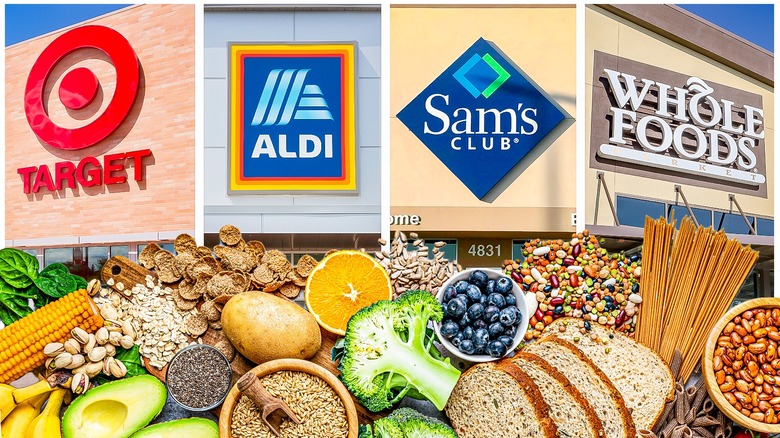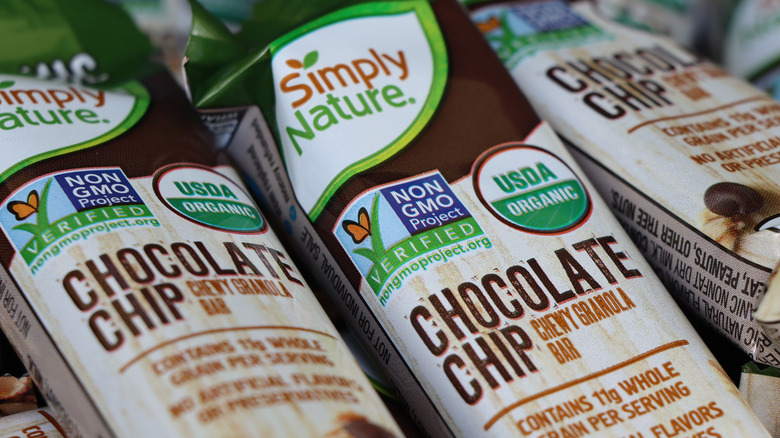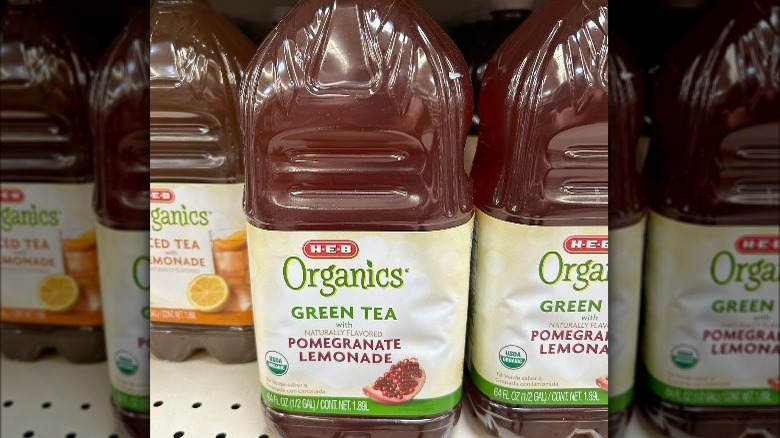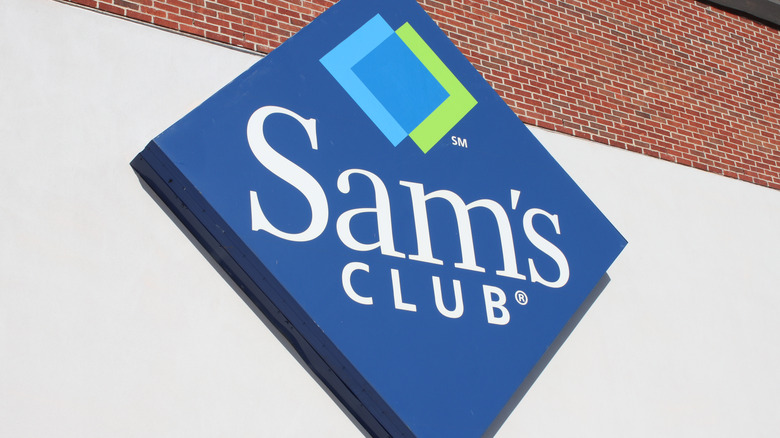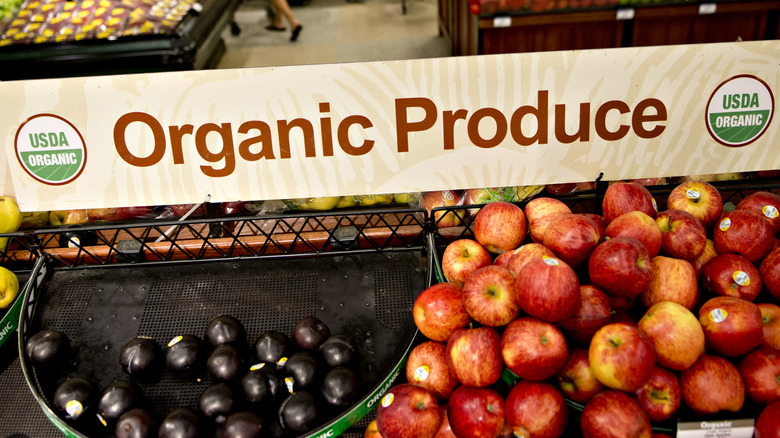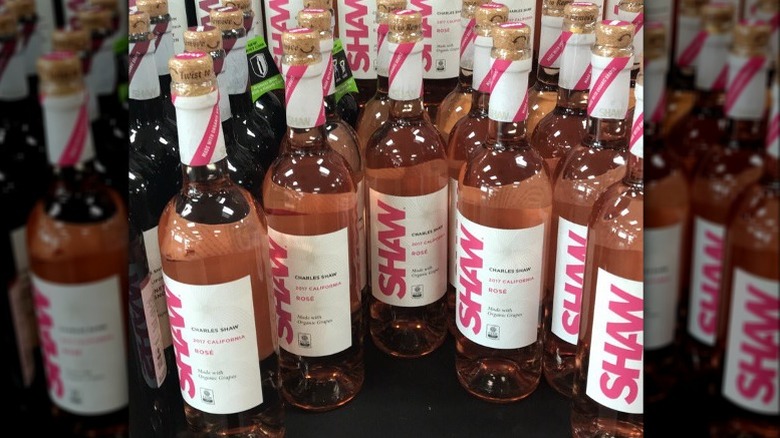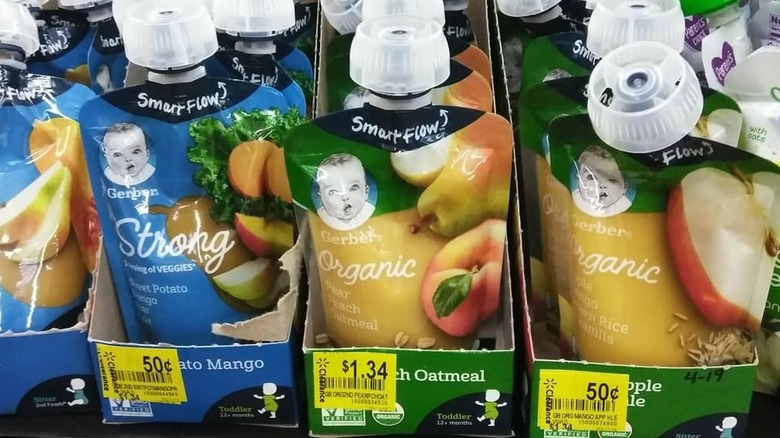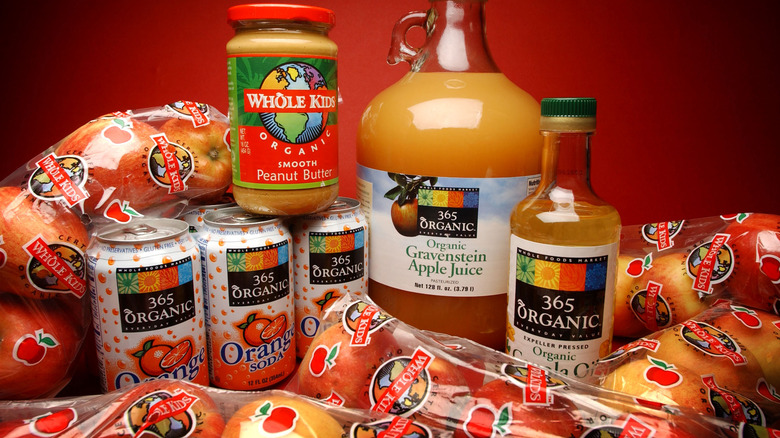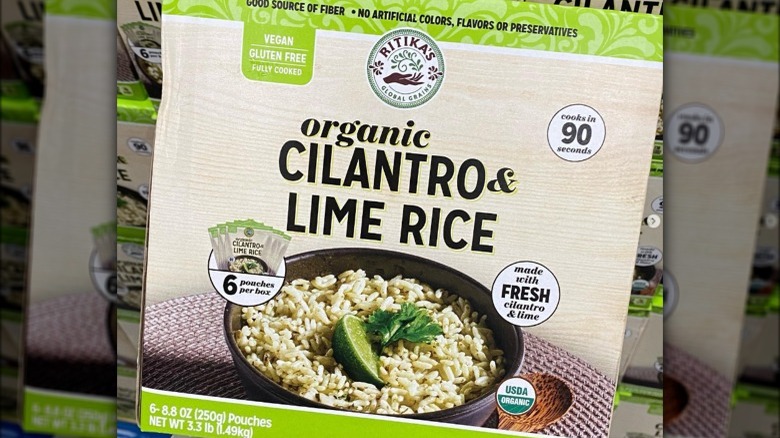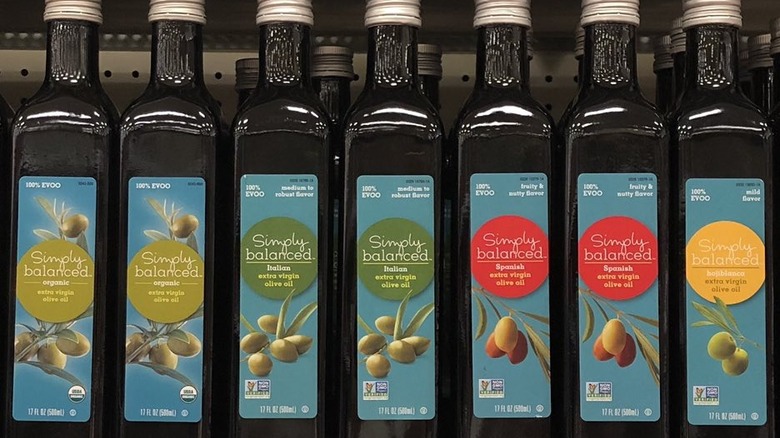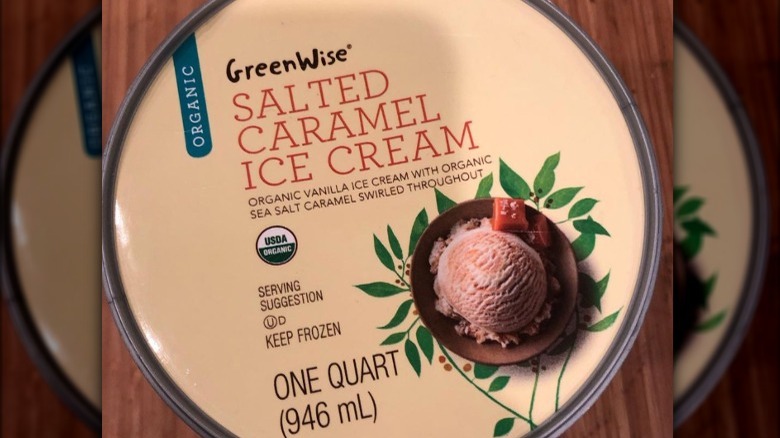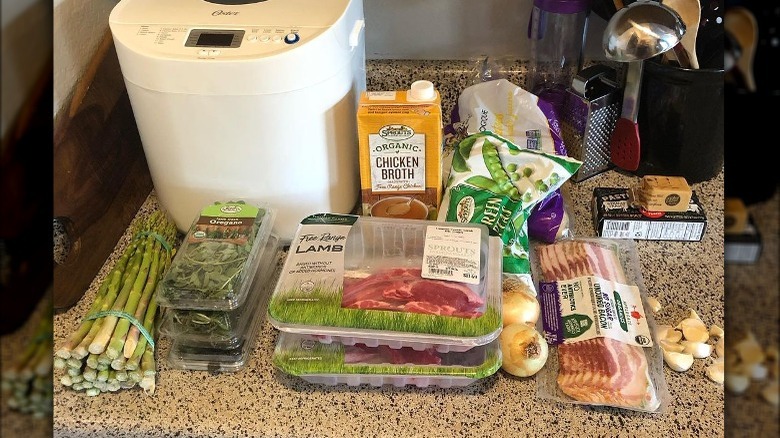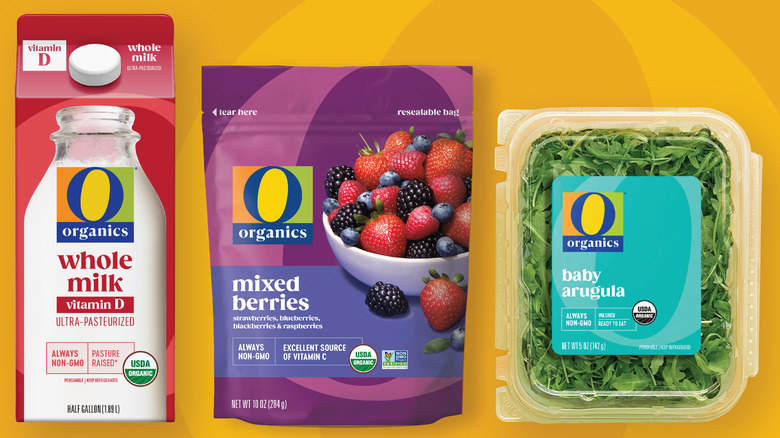The Best And Worst Grocery Stores To Buy Organic Food
The organic food industry has increased exponentially over the past decade, and it doesn't show any signs of slowing down. According to Statista, the value of organic packaged food alone is expected to reach more than $25 billion in the United States by 2025.
The growth of the industry could be largely due to moves made by grocery stores across the country. Many of them, including Aldi, Walmart, Kroger, and Target, have expanded their selections of organic food, with some even creating their own organic food brands to sell in their stores.
Still, while some stores have thrived in the organic food space, others haven't seen as much growth or given customers the selection they expect to see while they shop. We've rounded up the details on the best and worst grocery stores to buy organic food to help you out. If you're adopting a more organic lifestyle or trying to find the best grocery stores near you to boost your organic food stock, continue reading this guide.
Best: Aldi
Despite many locations having a smaller footprint than most supermarkets or grocery stores, Aldi has an impressive selection of organic products, many of which fall under its own label, Simply Nature. This lineup of organic foods includes milk, yogurt, bakery goods, meat, drinks, and pantry items, like rice, cereals, and condiments. And don't pass up the produce aisle if you're looking for fresh organic foods because Aldi tends to have it stocked with fruits and veggies to choose from. Organic baby kale, bananas, strawberries, and tomatoes are among the many options available in the Aldi produce aisle.
To top off its excellent selection, Aldi's organic items are comparably affordable to those you'd find at other grocery stores. In fact, for CNBC, one writer compared prices of organic food at Aldi and other stores like Walmart and Trader Joe's. Several of Aldi's organic items were at least a bit cheaper than similar items at other stores, including spaghetti, chicken broth, and extra virgin olive oil. While you may not be able to get hard-to-find organic products here, you'll likely save money on many of your staples.
Best: H-E-B
Back in 2014, H-E-B. decided to ramp up its offerings of organic products across all of its stores in Texas and Mexico by releasing its organic product line, H‑E‑B Organics. The lineup includes only certified USDA organic products and offers a wide variety of food, from canned items to must-have pantry foods. H-E-B Organics also has a sub-line of organic foods for kids that are perfect for stashing in lunch boxes, like snacks and string cheese.
The H-E-B Organics line has only grown since then, with more organic food brands introducing their products in H-E-B stores. For instance, in 2022, Amara Organic Foods announced its transition into more than 200 H-E-B locations in the United States. Also in 2022, Lechia, a company offering organic dairy milk alternatives, began offering its products in H-E-B stores. With the upward trend in organic products making their way to H-E-B, shoppers should be prepared to start seeing more and more organic items beyond H-E-B's own brand hitting the shelves.
Worst: Sam's Club
Sam's Club is awesome at many things, including offering excellent deals on bulk items and handing out tasty free samples while you shop. But one thing it's not well-known for is its selection of organic products. Sure, you'll find organic items in its produce department and on various shelves throughout the store. But, as with several items that Sam's Club stocks, you won't necessarily know how long an organic product might stick around for, making it one of the less reliable places to shop for organic products.
As with all warehouse-style stores, Sam's Club inventory isn't guaranteed to stick around until your next shopping trip. Because the store tends to have a limited selection of organic items, it might be challenging for organic-focused shoppers to know what they can expect to find during their next Sam's Club run. As an example, when comparing a shopping trip at Costco to Sam's Club to see if there was a clear winner, one shopper for Business Insider found that Costco had more organic items to choose from; Investopedia confirms this. We've had similar experiences when comparing the two. While we do like to stock up on organic coffee, snacks, and common produce items when we visit Sam's Club, we tend to save our biggest organic hauls for other retailers.
Best: Kroger
In 2007, Kroger was one of the earliest adopters of an expanded organic food selection at its grocery stores. That's when the company announced it would start placing its private brand of organic foods throughout the store, intertwining them with nonorganic items in their categorical aisles rather than placing them in the Natural Foods section. As a result, shoppers could more easily find organic alternatives to products they already use, with affordable pricing that makes the products more accessible to all.
This focus on organic food accessibility from Kroger has continued. In 2023, the company celebrated the 10th anniversary of its Simple Truth organic brand, which is worth more than $3 billion. In addition to organic offerings, Simple Truth also appeals to shoppers looking for natural and Fair Trade-friendly products and food made without artificial dyes, flavors, sweeteners, and preservatives. To save money on your favorite organic items from Kroger, the grocer frequently offers coupons for Simple Truth items that you can add to your digital account.
Best: Trader Joe's
For years, Trader Joe's has had a unique organic product on its shelves that you won't find in many grocery stores: a lineup of wines made from organic grapes. The grocer's Charles Shaw wines are not only organic, but they're also super affordable. In fact, they used to be just $1.99 a bottle, coining the name "Two-Buck Chuck."
Now, they're a bit more expensive, but not much. You can still find bottles for a mere $3.99, including the wildly popular Shaw Red Blend, which is designed to be a smoother and more welcoming flavor for casual wine drinkers. One Twitter user calls Trader Joe's organic wine the "best $4 I ever spent."
Of course, Trader Joe's organic selection doesn't stop at wine, although it's safe to say the wine is a big draw for many customers. The company also has an array of other affordable organic foods like ground coffee, dairy products, prepared drinks, produce, and more.
Worst: Walmart
Walmart and affordable prices tend to go hand in hand. The massive retailer is known for its rollback prices that compete with traditional grocery stores, clothing retailers, office supply chains, and more. You can also find just about anything you need at Walmart, including organic food.
Unfortunately, you may not find what you hoped for at Walmart if you're shopping organic. Organic produce can be expensive at Walmart compared to other places like Aldi and Kroger. A shopper for Business Insider also found that, when comparing their Walmart experience to that of Whole Foods, Walmart had many fewer organic produce options, and some of the prices at Walmart were notably higher. On a better note, the same shopper found Walmart's organic meat section much more affordable. However, Whole Foods took the overall win for people who shop mostly or all organic.
One problem some organic food advocates see with Walmart's race to lower prices is that it could end up industrializing the organic food industry to reduce costs and turn a profit. This may contradict the very purpose of organic food practices and put small-scale farmers out of business. Mark Smallwood, the executive director of The Rodale Institute, tells Grist that, as Walmart scales its organic food selection with lower-than-usual prices, "Somebody's going to have to pay, and my hope is that it's not the organic farmer."
Best: Whole Foods
If you're a regular Whole Foods customer, it probably doesn't surprise you that Whole Foods made our list. After all, the company originated as a health food store back in the 1970s. Since then, Whole Foods has strived to make waves as a different kind of grocer, putting sustainability and health-conscious food at its center.
That has led to Whole Foods being the very first national grocery store to become certified organic in 2003. That means that its stores adhere to strict USDA standards to remain certified, including complying with labeling standards, using the proper sanitation and cleaning methods, and verifying organic food sources. In the end, shoppers get trustworthy organic foods that meet those standards from farms and manufacturers. Whole Foods gets recertified annually.
To date, Whole Foods has one of the most impressive selections of organic foods, too, boasting more than 20,000 organic products across its stores nationwide. While Whole Foods' pricing for organic items sometimes ranges higher than other grocers, the quality you get might be worth the extra cost for some shoppers.
Best: Costco
While Sam's Club is a warehouse-style membership store that tends to fall behind in the organics realm, Costco picks up the slack. In fact, a few Instagram accounts are dedicated solely to finding and promoting Costco's organic items, helping others track down new and popular organic foods within their local Costco stores.
Costco shoppers have gotten so into the store's organic offerings that a few years ago, according to HuffPost, analysts predicted Costco would edge out organics giant Whole Foods in terms of sales. The year after that original article was published, HuffPost published another article reporting that Costco's organic products were doing so well that it was causing a supply-and-demand problem. This prompted the company to give organic farmers money to buy more land and equipment to help keep up with the needs of its customers.
Today, it seems that Costco has ironed out the problem, and customers are happier than ever, as evidenced by the Costco-loving Instagram accounts that post about organic items consistently. The selection at Costco is truly widespread, including everything from organic meats and dairy products to frozen fruits and veggies and pantry staples.
Worst: Target
In 2009, Target made waves after admitting to advertising a soy milk product as organic when it wasn't. The topic was brought to light by the Cornucopia Institute, alleging that the company was selling soy milk as organic when, in reality, it wasn't being made with organic soybeans. In 2023, the USDA strengthened its rules regarding labeling items as organic, making it more difficult for companies to have similar habits.
However, Target still seems to be attempting to undo some of the damage brought to the company since its labeling blunder by making over its organic products and introducing new organics to its lineup. In 2013, Target announced its own brand of organic and natural products, known as Simply Balanced. After only a few years on the market, Target rebranded Simply Balanced and its newer Archer Farms lineup to Good & Gather, phasing out the old products slowly until completing the rebrand in 2023. Time will tell if this rebrand will be the final one for Target, but it's safe to say the company has had a rocky road in the organics sector up to this point.
Best: Publix
Publix is a prime place to find organic foods. The company's GreenWise line includes USDA-certified organic items, each with at least 70% organic ingredients. Plus, the lineup offers other health-focused benefits, like being made without specific flavors and additives and coming from animals that aren't fed hormones or antibiotics. In other words, you'll probably feel good about what you buy from the GreenWise selection.
GreenWise products have been so popular at Publix that the company created separate stores solely for the lineup, called GreenWise Market, starting in 2007. While this was good news for people who lived by a location and preferred to shop totally organic, that meant less representation for the brand in Publix stores. Fortunately, in May 2023, Publix announced that it would be relocating these markets back into Publix stores, allowing Publix shoppers to get the full GreenWise experience without having to shop at a GreenWise Market.
Another reason to shop at Publix for organic food: Your child might be able to grab some organic fruit for free while you shop. Some Publix stores have small bins of fruit available for kids to keep hungry bellies at bay in the store. Sometimes, organic bananas, apples, or other fruit are in the bins at no cost to you.
Best: Sprouts Farmers Market
Sprouts Farmers Market isn't as widely available as some of the others on our list, but if you happen to live near one, you should probably check it out for its selection of organic foods. Sprouts Farmers Market has a strong focus on sustainability, and prioritizing organic foods is one of the primary ways it sticks to its commitment to more sustainable processes.
At Sprouts Farmers Market, you'll find all sorts of organic foods in just about every department, thanks to the company's huge selection of organic pantry items, frozen foods, produce, and more. You could stock your refrigerator and cabinets with everything from organic condiments and snack bars to organic peanut oil and cereal. Customers especially love its selection of organic baby food pouches, jars, and snack items. One Twitter user even calls it "organic baby food heaven."
You might even be able to save some money on organic products at your local Sprouts Farmers Market with its Reduced Organic program. The program is available at several locations across California, offering reduced prices on imperfect organic fruits and vegetables, such as ones that are a bit bumped, bruised, discolored, or misshapen. If you don't mind foods that look a little different, consider reducing food waste and your overall costs by buying from the Reduced Organic program.
Best: Albertson's
Albertson's is on track to become a leader in the organic food space with its O Organics brand, which includes just about every type of organic product you can buy at prices that are relatively affordable for organics. For example, the brand's gold potatoes are just $2 per pound, and 72-packs of organic coffee pods are under $30.
Early in 2023, Albertson's announced an exciting rebrand of its already popular organics brand with bright packaging that stands out on store shelves and lends a more modern, fun vibe to organic foods. It's the first major rebrand O Organics received since its 2005 launch, coming after the brand grew to become one of the largest USDA-certified organic brands available to date. If you shopped Albertson's today, you can find over 1,500 organic products in its O Organics brand alone.
Although you can find other organic foods at Albertson's, O Organics products will likely save you a good amount of cash. For example, one Twitter user compared O Organics orange juice with a similar product from Uncle Matt's, showing the latter priced at $8.99. The O Organics version? Just $6.49.
